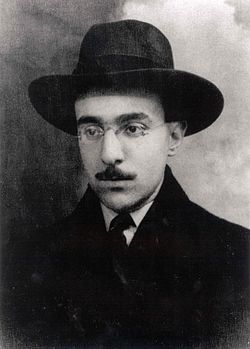Fernando Pessoa Quote
I asked for very little from life, and even this little was denied me. A nearby field, a ray of sunlight, a little bit of calm along with a bit of bread, not to feel oppressed by the knowledge that I exist, not to demand anything from others, and not to have others demand anything from me – this was denied me, like the spare change we might deny a beggar not because we’re mean-hearted but because we don’t feel like unbuttoning our coat.
Fernando Pessoa
I asked for very little from life, and even this little was denied me. A nearby field, a ray of sunlight, a little bit of calm along with a bit of bread, not to feel oppressed by the knowledge that I exist, not to demand anything from others, and not to have others demand anything from me – this was denied me, like the spare change we might deny a beggar not because we’re mean-hearted but because we don’t feel like unbuttoning our coat.
Related Quotes
About Fernando Pessoa
Fernando António Nogueira de Seabra Pessoa (; Portuguese: [fɨɾˈnɐ̃du pɨˈsoɐ]; 13 June 1888 – 30 November 1935) was a Portuguese poet, writer, literary critic, translator, and publisher. He has been described as one of the most significant literary figures of the 20th century and one of the greatest poets in the Portuguese language. He also wrote in and translated from English and French.
Pessoa was a prolific writer both in his own name and approximately seventy-five other names, of which three stand out: Alberto Caeiro, Álvaro de Campos, and Ricardo Reis. He did not define these as pseudonyms because he felt that this did not capture their true independent intellectual life and instead called them heteronyms, a term he invented. These imaginary figures sometimes held unpopular or extreme views.
Pessoa was a prolific writer both in his own name and approximately seventy-five other names, of which three stand out: Alberto Caeiro, Álvaro de Campos, and Ricardo Reis. He did not define these as pseudonyms because he felt that this did not capture their true independent intellectual life and instead called them heteronyms, a term he invented. These imaginary figures sometimes held unpopular or extreme views.
